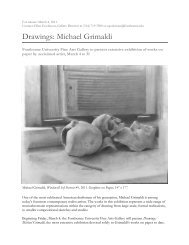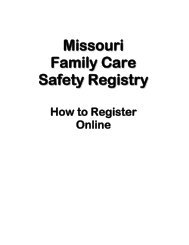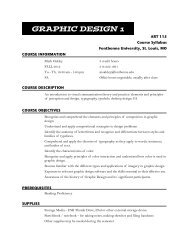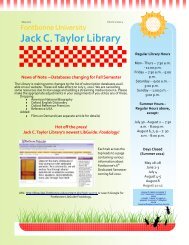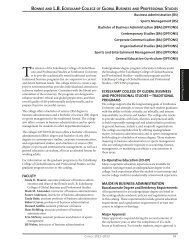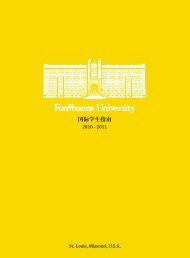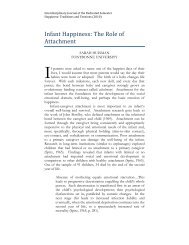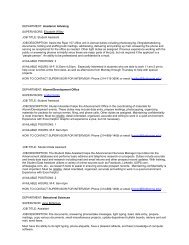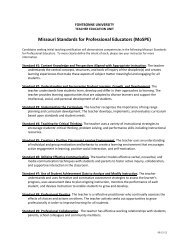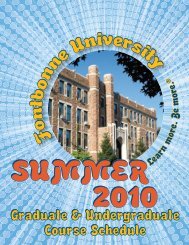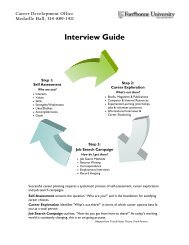Click here (pdf, 891.09KB) - Fontbonne University
Click here (pdf, 891.09KB) - Fontbonne University
Click here (pdf, 891.09KB) - Fontbonne University
Create successful ePaper yourself
Turn your PDF publications into a flip-book with our unique Google optimized e-Paper software.
<strong>Fontbonne</strong> <strong>University</strong> will engage the services of a qualified laboratory to conduct the drug<br />
test. A positive test result for unlawful drugs (or lawful drugs not used in connection with and<br />
in conformity with a physician’s prescription) or an adulterated or diluted sample as reported<br />
by the testing laboratory, may result in the student not being permitted to live on campus,<br />
suspension, dismissal or other action that <strong>Fontbonne</strong> <strong>University</strong>, in its sole discretion, deems<br />
appropriate depending on the circumstances. If a student refuses to take a drug test, such<br />
refusal will be treated the same as a positive test result.<br />
<strong>Fontbonne</strong> <strong>University</strong> recognizes that substance abuse is an illness and a health problem.<br />
<strong>Fontbonne</strong> <strong>University</strong> is willing to help students obtain assistance needed in the resolution of<br />
a substance abuse problem.<br />
<strong>Fontbonne</strong> <strong>University</strong> will make good faith efforts to maintain the confidentiality of all drug<br />
test results. Test results may be disclosed to the student, the student’s parents or guardians,<br />
and to those who have a legitimate need to know, as determined by <strong>Fontbonne</strong> <strong>University</strong>, in<br />
its sole discretion.<br />
druG Free WorkplACe<br />
The unlawful use of a controlled substance in any setting is dangerous. Employees of<br />
<strong>Fontbonne</strong> <strong>University</strong>, including students in work study positions, who unlawfully use a<br />
controlled substance in the workplace not only jeopardize their own employment and safety,<br />
they also place other employees, our students and guests of the <strong>University</strong> at personal risk.<br />
All employees of the <strong>University</strong> serve as role models for students. And, the unlawful use of a<br />
controlled substance in the workplace would not only violate laws, but is contrary to the spirit<br />
and mission of <strong>Fontbonne</strong> <strong>University</strong>.<br />
<strong>Fontbonne</strong> abides by the provisions of the Higher Education Amendment of 1998 and all<br />
employees and students, including those making application for Federal Pell Grants, are<br />
required to sign a statement of compliance.<br />
heAlth insurAnCe<br />
Student accident and sickness insurance information is available in the Student Affairs office<br />
on the first floor of Medaille Hall. The plans are voluntary and optional. Each student deals<br />
directly with the insurance company and no plan is sponsored or specifically endorsed by the<br />
<strong>University</strong>.<br />
All international students accepted for study at <strong>Fontbonne</strong> <strong>University</strong> will be required to carry<br />
medical/health insurance by an insurance company selected by <strong>Fontbonne</strong> <strong>University</strong> in the<br />
U.S. Purchase of such insurance coverage will be completed at the time of registration at the<br />
<strong>University</strong>.<br />
All students participating in inter-collegiate athletics must verify with the Athletic Director that<br />
they have adequate medical insurance and are in sound physical condition. This verification<br />
needs to be documented with insurance and by physician’s certifications. The <strong>University</strong> does<br />
not carry primary medical insurance on any student.<br />
MediCAl ForMs<br />
All resident students are required to have an emergency medical form on file in the Student<br />
Affairs Office. Resident students and all international students must also provide medical<br />
documentation of tuberculin skin tests, and inoculations for mumps and meningitis.<br />
nondisCriMinAtion<br />
<strong>Fontbonne</strong> <strong>University</strong> does not discriminate on the basis of race, color, religion, age, gender,<br />
gender orientation, national or ethnic origin, or disability in employment or in the administration<br />
of its educational policies, admission policies, scholarship and loan programs, or athletic and<br />
other school-administered programs. Furthermore, <strong>Fontbonne</strong> <strong>University</strong> prohibits retaliation<br />
against anyone who either opposes unlawful discrimination, assists or participates in an<br />
investigation of a complaint of discrimination, or exercises that person’s rights under any law<br />
that forbids employment discrimination.<br />
The <strong>Fontbonne</strong> <strong>University</strong> coordinator for Title IX and Section 504 of the Rehabilitation Act<br />
of 1973 and the EEO Coordinator for other laws and regulations prohibiting discrimination is<br />
Vice President for Finance and Administration<br />
<strong>Fontbonne</strong> <strong>University</strong><br />
6800 Wydown Boulevard<br />
St. Louis, MO 63105<br />
Phone: (314) 719-8017<br />
Fax: (314) 719-8023<br />
If the allegations of discrimination or retaliation allege involvement of the Vice President for<br />
Finance and Administration, then notification of the complaint shall be made to the Executive<br />
Vice President for Strategy and Operations. The <strong>University</strong> will thoroughly and promptly<br />
investigate all complaints and take corrective or disciplinary action when appropriate.<br />
<strong>Fontbonne</strong> <strong>University</strong> complies with the Family Educational Rights and Privacy Act of 1974,<br />
Public Law 93-380, as amended.<br />
Policy Prohibiting Harassment<br />
Harassment based on an individual’s race, color, religion, age, gender, gender orientation,<br />
national or ethnic origin, disability or other status protected by law is not tolerated at <strong>Fontbonne</strong><br />
<strong>University</strong>. Harassment consists of unwelcome conduct, whether verbal, physical or visual,<br />
that is based on a person’s protected status. Examples of harassing conduct include: epithets,<br />
slurs, jokes, teasing, kidding, negative stereotyping, and threatening or hostile acts that relate<br />
to an individual’s protected status.<br />
Any written or graphic material, including any electronically transmitted or displayed material<br />
that likewise denigrates or shows hostility toward members of these protected groups is<br />
considered harassment. <strong>Fontbonne</strong> <strong>University</strong> will not tolerate harassing conduct that:<br />
• creates an intimidating, hostile or offensive working or academic environment.<br />
• affects tangible employment benefits.<br />
• interferes unreasonably with an individual’s working or academic environment or performance.<br />
Sexual Harassment<br />
Sexual harassment involves any one or more of unwelcome sexual advances, requests for<br />
sexual favors, and other visual, verbal or physical conduct based on sex when:<br />
1. Such conduct has the purpose or effect of creating an intimidating, hostile or offensive<br />
working or learning environment or unreasonably interfering with an individual’s work<br />
or academic performance.<br />
2. Submission to such conduct is an explicit or implicit term or condition of an individual’s<br />
employment or academic activities.<br />
3. Submission to rejection of such conduct by an individual is used as the basis for employment<br />
or academic decisions affecting that individual.<br />
Sexual harassment may include: unwanted sexual advances; explicit sexual propositions;<br />
displaying sexually suggestive objects; pictures or materials; sexual innuendo; sexually-oriented<br />
verbal abuse; sexually suggestive comments; unwanted contact such as touching, patting,<br />
stroking, pinching, or brushing against another’s body; sexually oriented kidding, teasing<br />
or practical jokes; jokes about gender specific traits; foul or obscene gestures or language.<br />
Sexual harassment also involves inappropriate conduct toward an individual which, although<br />
not motivated by sexual desire, would not have occurred except for that person’s gender.<br />
40 41




